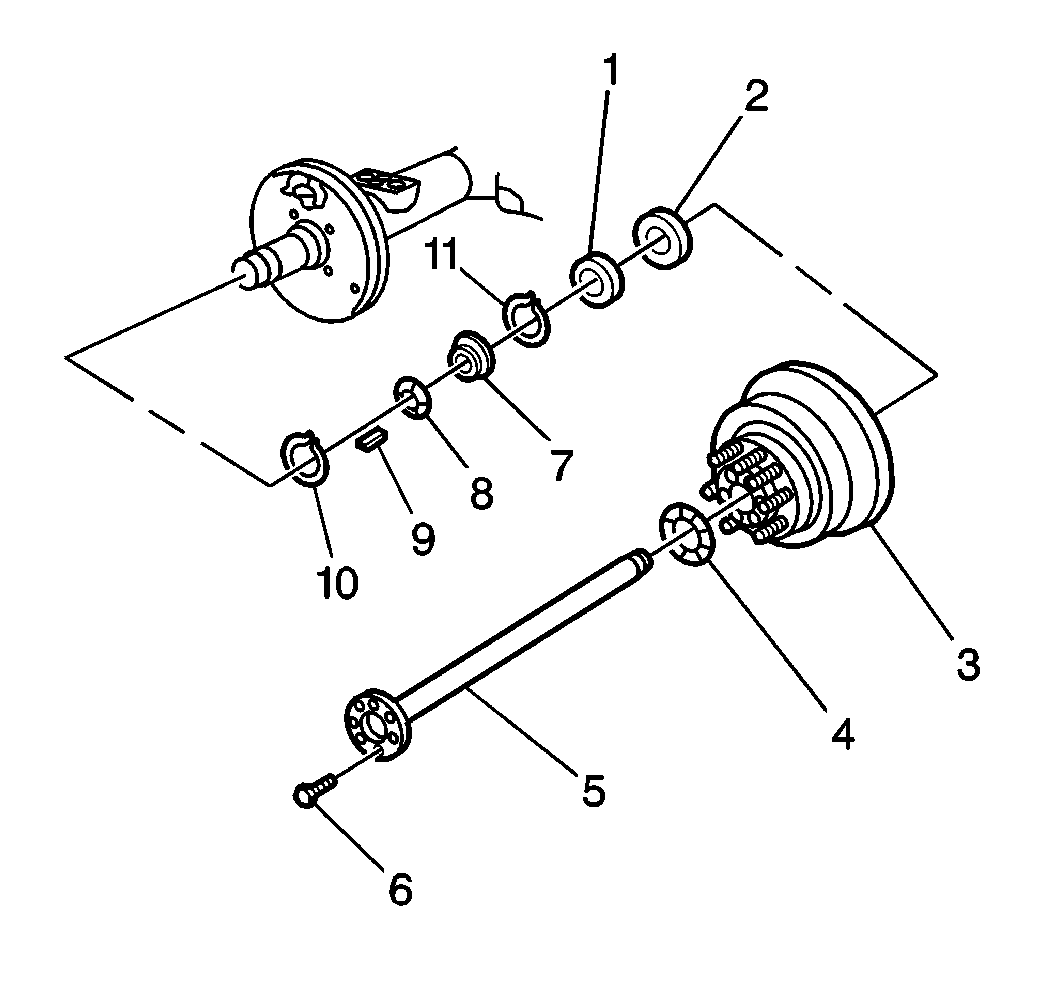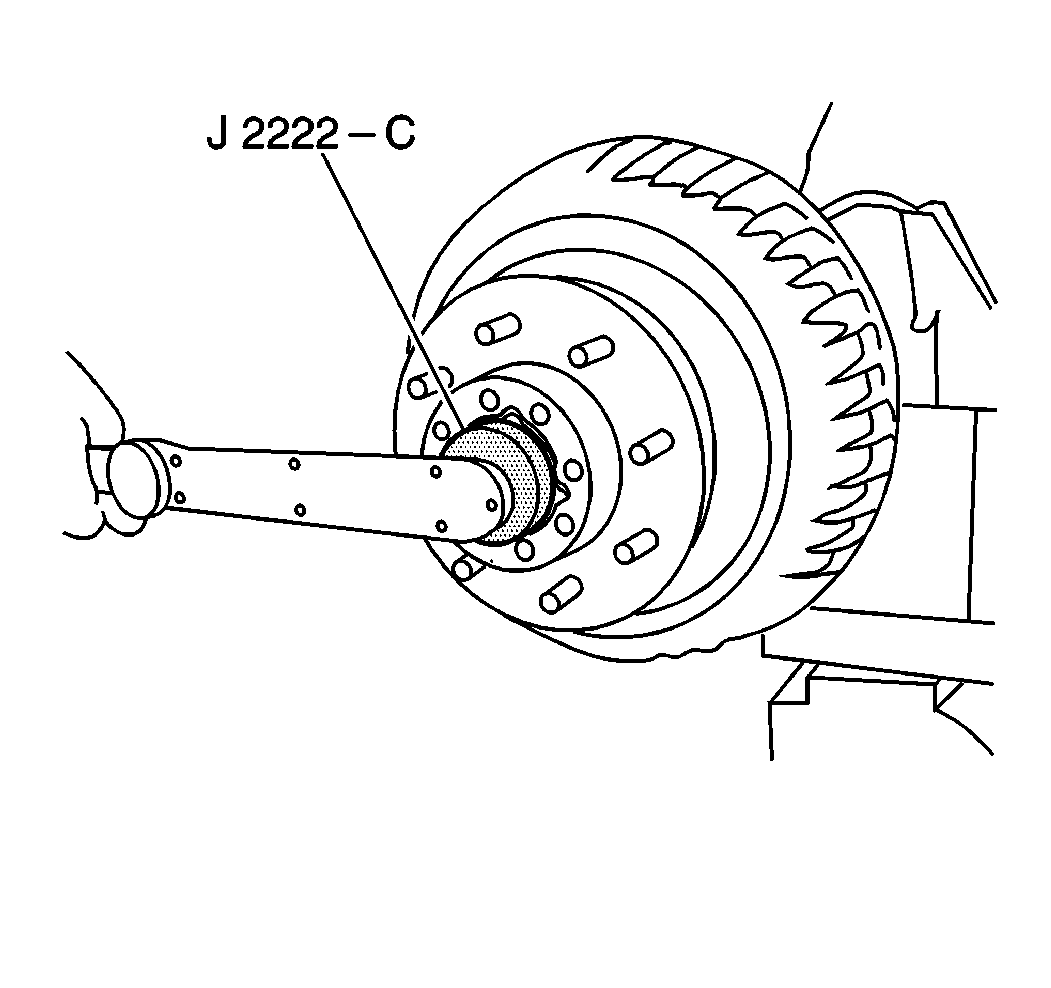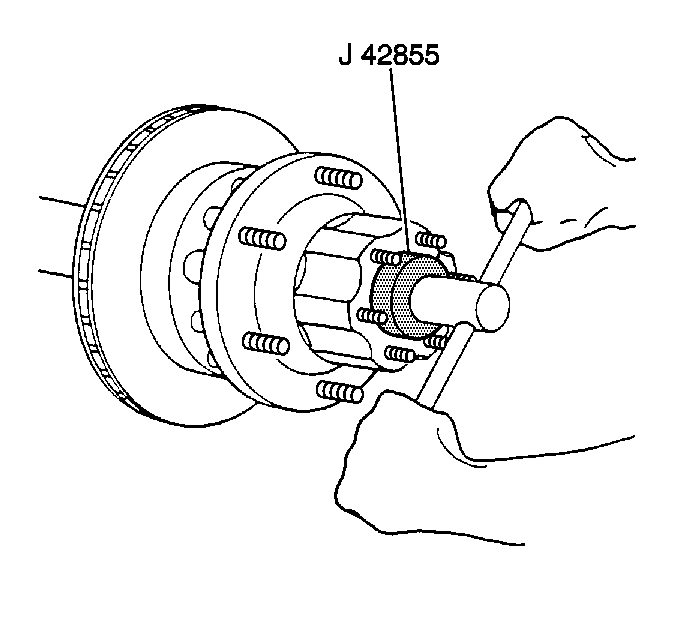Wheel Bearing Adjustment Drum Brakes
Diagnostic Procedure
- Ensure that the brakes are fully released and do not drag.
- Pull or push the tire at the top back and forth in order to inspect
the wheel bearing play.
| • | Use a pry bar under the tire as an alternative. |
| • | If the wheel bearing adjustment is correct, movement of the brake
drum in relation to the brake backing plate will be barely noticeable. |
| • | If the movement of the brake drum in relation to the brake backing
plate is excessive, adjust the bearings. |
Removal Procedure
Tools Required
J 2222-C Wheel Bearing
Nut Wrench
- Raise the vehicle until the wheel is free to spin.

- Remove the axle shaft (5).
Refer to
Axle Shaft Replacement
.
- Ensure that the following components are free of chips, burrs
and shavings:
- Remove the retaining ring (10).
- Remove the wheel bearing adjusting key (9).
- Ensure the bearings are seated and in contact with the spindle
shoulder.

Notice: Use the correct fastener in the correct location. Replacement fasteners
must be the correct part number for that application. Fasteners requiring
replacement or fasteners requiring the use of thread locking compound or sealant
are identified in the service procedure. Do not use paints, lubricants, or
corrosion inhibitors on fasteners or fastener joint surfaces unless specified.
These coatings affect fastener torque and joint clamping force and may damage
the fastener. Use the correct tightening sequence and specifications when
installing fasteners in order to avoid damage to parts and systems.
- Tighten the wheel
bearing adjusting nut using the J 2222-C
.
Tighten
Tighten the adjusting nut to 68 N·m (50 lb ft).
- Adjust the adjusting nut as follows:
| 8.1. | Back off the adjusting nut until the adjusting nut is just loose,
but not more than one slot of the lock or the axle spindle. |
| 8.2. | Align the closest adjusting nut slot with the keyway in the axle
spindle. |
Installation Procedure
Tools Required
J 2222-C Wheel Bearing
Nut Wrench

- Install the wheel bearing
adjusting key (9) into the keyway and adjusting nut slot.
- Install the retaining ring (10). Ensure that the retaining
ring is seated.
- Install the axle shaft (5). Refer to
Axle Shaft Replacement
.
Wheel Bearing Adjustment Disc Brakes
Diagnostic Procedure
- Ensure that the brakes are fully released and do not drag.
- Pull or push the tire at the top back and forth in order to inspect
the wheel bearing play.
| • | Use a pry bar under the tire as an alternative. |
| • | If the wheel bearing adjustment is correct, movement of the brake
drum in relation to the brake backing plate will be barely noticeable. |
| • | If the movement of the brake drum in relation to the brake backing
plate is excessive, adjust the bearings. |
Removal Procedure
Tools Required

- Raise the vehicle until
the wheel is free to spin.
- Remove the axle shaft. Refer to
Axle Shaft Replacement
.
- Remove the outer locknut.
- Disengage the lock washer from the adjusting nut.
- Remove the lock washer.
- Adjust the adjusting nut.
| 6.1. | Ensure that the bearing cones are seated and in contact with the
spindle shoulder. |
Notice: Use the correct fastener in the correct location. Replacement fasteners
must be the correct part number for that application. Fasteners requiring
replacement or fasteners requiring the use of thread locking compound or sealant
are identified in the service procedure. Do not use paints, lubricants, or
corrosion inhibitors on fasteners or fastener joint surfaces unless specified.
These coatings affect fastener torque and joint clamping force and may damage
the fastener. Use the correct tightening sequence and specifications when
installing fasteners in order to avoid damage to parts and systems.
| 6.2. | Tighten the adjusting
nut (using J 2222-C
for
American Axle equipped vehicles, or J 42855
for Dana Axle equipped vehicles)
while rotating the hub assembly. |
Tighten
Tighten the adjusting nut to 68 N·m (50 lb ft).
| 6.3. | Back off the adjusting nut. Retighten the adjusting nut while
rotating the hub. |
Tighten
Tighten the adjusting nut to 47 N·m (35 lb ft).
| 6.4. | Back off the adjusting nut 135-150 degrees. |
Installation Procedure
Tools Required

- Install the lock washer.
- Bend one tang of the lock washer a minimum of 30 degrees
over a flat of the adjusting nut.
Notice: Use the correct fastener in the correct location. Replacement fasteners
must be the correct part number for that application. Fasteners requiring
replacement or fasteners requiring the use of thread locking compound or sealant
are identified in the service procedure. Do not use paints, lubricants, or
corrosion inhibitors on fasteners or fastener joint surfaces unless specified.
These coatings affect fastener torque and joint clamping force and may damage
the fastener. Use the correct tightening sequence and specifications when
installing fasteners in order to avoid damage to parts and systems.
- Install the outer
locknut
Tighten
Tighten the outer locknut to 88 N·m (65 lb ft).
- Set the bearing adjustment to 0.025-0.25 mm (0.001-0.01 in).
- Bend one tang of the lock washer a minimum of 60 degrees
over a flat of the outer locknut.
- Apply the wheel bearing grease into the bearings.
- Install the axle shaft. Refer to
Axle Shaft Replacement
.
- Lower the vehicle.
Wheel Bearing Adjustment 10 1/2 in. Ring Gear
Diagnostic Procedure
Tools Required
J 2222-C Wheel Bearing
Nut Wrench
- Make sure the brakes are fully released and do not drag.
- Pull or push the tire at the top back and forth in order to check
the wheel bearing play.
| • | Use a pry bar under the tire as an alternative. |
| • | If the wheel bearing adjustment is correct, movement of the brake
drum in relation to the brake backing plate will be barely noticeable. |
| • | If the movement of the brake drum in relation to the brake backing
plate is excessive, adjust the bearings. |
Removal Procedure
Tools Required
J 2222-C Wheel Bearing
Nut Wrench
- Raise the vehicle until the wheel is free to spin.

- Remove the axle shaft
(5). Refer to
Axle Shaft Replacement
.
- Be sure thse are free of chips, burrs and shavings:
- Remove the retaining ring (10).
- Remove the wheel bearing adjusting key (9).
- Make sure the bearings are seated and in contact with the spindle
shoulder.

Notice: Use the correct fastener in the correct location. Replacement fasteners
must be the correct part number for that application. Fasteners requiring
replacement or fasteners requiring the use of thread locking compound or sealant
are identified in the service procedure. Do not use paints, lubricants, or
corrosion inhibitors on fasteners or fastener joint surfaces unless specified.
These coatings affect fastener torque and joint clamping force and may damage
the fastener. Use the correct tightening sequence and specifications when
installing fasteners in order to avoid damage to parts and systems.
- Tighten the wheel
bearing adjusting nut using the J 2222-C
.
Tighten
Tighten the adjusting nut to 68 N·m (50 lb ft).
- Adjust the adjusting nut as follows:
| 8.1. | Back off the adjusting nut until the adjusting nut is just loose,
but not more than one slot of the lock or the axle spindle. |
| 8.2. | Align the closest adjusting nut slot with the keyway in the axle
spindle. |
Installation Procedure
Tools Required
J 2222-C Wheel Bearing
Nut Wrench

- Install the wheel bearing
adjusting key (9) into the keyway and adjusting nut slot.
- Install the retaining ring (10). Make sure the retaining ring
is seated.
- Install the axle shaft (5). Refer to
Axle Shaft Replacement
.








